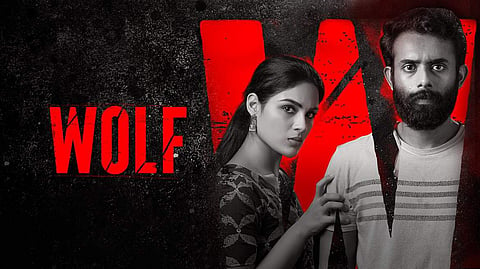Wolf Movie Review: Engaging psychological drama derailed by a shaky third act
Rating:(3 / 5)
Wolf, directed by Shaji Azeez and coming from the imagination of GR Indugopan, one of contemporary Malayalam literature's most gifted storytellers, has enough factors that make for a riveting mind game. Like Love and Irul before it, a house becomes a playground for intense characters. For a large part of its runtime, its three principal actors have us in a vice-like grip until a baffling climax brings everything down. Fortunately, Wolf is no Irul (it doesn't have a casting problem like the latter), but both films have a shaky third act that undoes everything that came before.
Director: Shaji Azeez
Cast: Arjun Ashokan, Samyuktha Menon, Irshad
Streaming on: Zee5
Based on Indugopan's short story, Chennaya, Wolf opens with Sanjay (Arjun Ashokan) on the way to see his would-be, Asha (Samyuktha Menon), hoping to surprise her. When she opens the door, she is surprised alright -- and visibly agitated too. The first half belongs entirely to Arjun and Samyuktha, who effectively deliver one anxiety-inducing moment after another. It soon becomes apparent that these two are not a match made in heaven. She doesn't want him there for reasons valid from her point of view -- and, of course, us. Every minute he spends at her home makes us more uncomfortable.
Asha has a conservative mother who is not at home at the moment, and the daughter worries that Sanjay's presence at this hour will turn her into gossip fodder. (The suspicious mom sounds like the male version of another Indugopan creation, Amminipilla, from his brilliant short story, Amminipilla Vettu Case). Besides, Asha sees Sanjay's short-temper and rude manners -- even to his close female friends -- as good enough reasons for not wanting him as her better half. She expresses her doubts about spending the rest of her life with him. He gets increasingly irritated and is desperate to ensure that he wouldn't be this way after their marriage. But we also get the sense that Asha is hiding something from us. To make matters worse, the PM announces the lockdown on the same night. Her mother won't get home on time, and since Sanjay's residence is hours away, the cops stationed outside her home (Shine Tom Chacko, Jaffer Idukki) forbid him from travel.
The film only gets more intense after a third character, Joe (Irshad), enters the picture; but our amusement lasts only up to a certain point. In an interview with us, Shaji Azeez called the third character a 'surprise' and, with that in mind, I won't describe who this man is and why he is in the story. But it would be safe to say that Shaji and Indugopan use him to launch a discourse on the intricacies of the male-female dynamics, the deeply entrenched patriarchal mindset of Indian men, a woman's agency when it comes to her personal choices, and how someone's 'image' on social media doesn't necessarily tell you who they really are. Though Sanjay's character traits are clear to us, we later realise that the other two characters are not exactly what they led us to believe initially.
For the most part, the film gives us the effect of watching a tightly constructed play, aided by appropriate staging and camera movements. It's fun to see the three characters slowly unravelling their true selves. The interplay reminded me of the Mike Nichols film Closer. However, Wolf has a problem: the inconsistency in character development. The primary issue here is the contradictory behaviour of the characters -- none of them stays faithful to their arc. They sometimes exhibit behaviour that makes one wonder if one person is trying to be three different people. They seem not sure of themselves but like to make you believe that they are.
When the film ends, all three characters undergo unconvincing character transformations, making one feel cheated. (The climax reminded me of a popular Shaji Kailas film scripted by Ranjith. You may remember the title once you see Wolf.) After all those long, colourful, and occasionally insightful dialogues, you wonder why a couple of characters decided to take a different route in the end. And I'm still trying to make sense of the casting of Shine Tom Chacko and Jaffer Idukki as those policemen. Were they necessary? Perhaps Wolf had the potential to be another debate-worthy film like Ishq or even The Great Indian Kitchen, but that ending...

